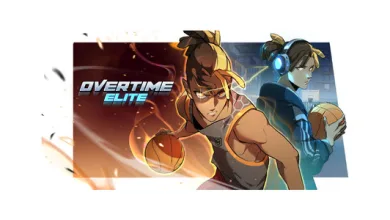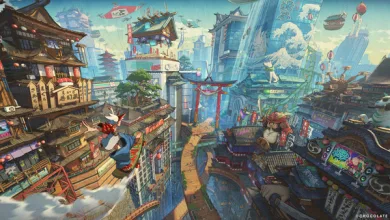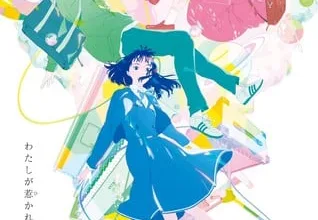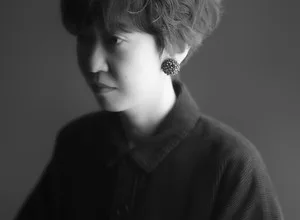Small-town Horror: Interview with The Summer Hikaru Died Creator Mokumokuren
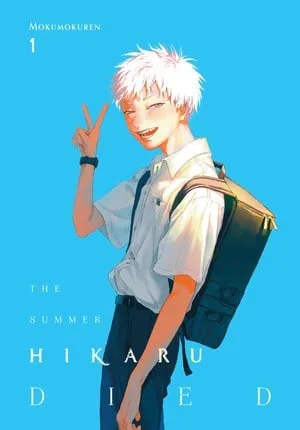
©Mokumokuren 2022/KADOKAWA CORPORATION
Manga creator Mokumokuren is having a good year. Their debut manga The Summer Hikaru Died was recently tapped for an anime adaptation, but not before making multiple entries on top manga lists, in the U.S. and Japan. Dripping with the sticky heat of summer, The Summer Hikaru Died focuses on introverted protagonist Yoshiki and the friction of his life living in a rural town in Japan. Already struggling with a difficult home life, things only get more complicated when his best friend Hikaru dies, only to return as something else.
We spoke with Mokumokuren about the emotional themes of the story and how their skyrocketing artistic career has been thus far.
日本の読者の方は、こちらをクリックして日本語のインタビューをお読みください。
Congratulations on your recent Eisner nominations for Best Writer/Artist and Best U.S. Edition of International Material—Asia. How did you feel when you first heard the news about your nomination?
MOKUMOKUREN: I was very honored to hear I was nominated for such a prestigious award. I’m happy to
know my work is recognized not only in Japan but overseas as well.
What has your experience been like, from sharing art on social media to selling almost a quarter million copies of your first published manga? Was your artistic journey long and arduous, or did it feel like an overnight success?
MOKUMOKUREN: It was such a short period of time from when the publisher contacted me to when it was published it didn’t really sink in. I was happy, but I also felt a lot of pressure. I was inexperienced in drawing manga, so it took a lot of work. But I was also lucky I didn’t know the standard procedure.
The Summer Hikaru Died takes place in a rural town in Japan. What about this setting appealed to you? Do you have personal experience growing up in a small town? Do you think rural life more easily lends itself to the manga’s horror elements?
MOKUMOKUREN: Rural towns in Japan are a classic setting for horror stories. I love horror stories, so I chose this setting because I wanted to incorporate traditional horror visuals out of respect. I grew up in the city, but my grandparents lived in the countryside. So, my experiences there have helped me depict it. All the stories about the countryside I heard from my parents were also useful in my work.
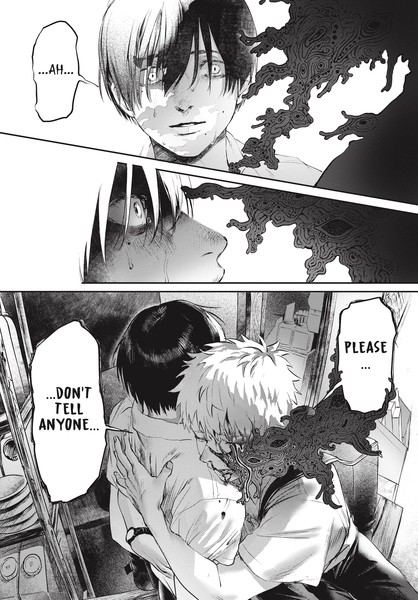
©Mokumokuren 2022/KADOKAWA CORPORATION
Part of what makes The Summer Hikaru Died so intriguing is the characters’ emotional vulnerability. What do you see as the emotional core of Yoshiki and “Hikaru” and their relationship?
MOKUMOKUREN: When we interact with people who are different from us, we tend to have preconceptions. We fit them into our existing values and lose sight of their true nature. Yoshiki is the same. At the beginning of the story, he interacts with the monster “Hikaru” with many preconceptions. However, as the story progresses, he realizes his preconceptions were wrong and needs to see the true nature of things.
“Hikaru,” who’s a non-human, is very different from the human Hikaru. In fact, he doesn’t understand emotions and logic that come naturally to humans. As he interacts with “Hikaru,” Yoshiki becomes aware of the preconceptions he has inside himself. The relationship between Yoshiki and Hikaru is very complicated. However, a major theme of this work is how to deal with complex things without being trapped by preconceptions. I don’t know if this is the answer to “the emotional core,” but I think it’s an important theme in their relationship.
Much of the horror also blends with eroticism between the two boys, like when Yoshiki feels inside of “Hikaru.” Is there a deeper meaning behind these moments?
MOKUMOKUREN: I drew the scene where Yoshiki puts his hand inside Hikaru’s stomach, thinking some people would find it erotic while others would find it “disgusting” and uncomfortable. Both feelings are correct and are exactly what the protagonist, Yoshiki, is feeling. I want people’s feelings toward the “unknown” to be not only “scary” but also sometimes sexual, sometimes unpleasant, and very complex. In reality, the more we find it difficult to accept something, the more sexualized or frightening it is and awakens something primal within us.
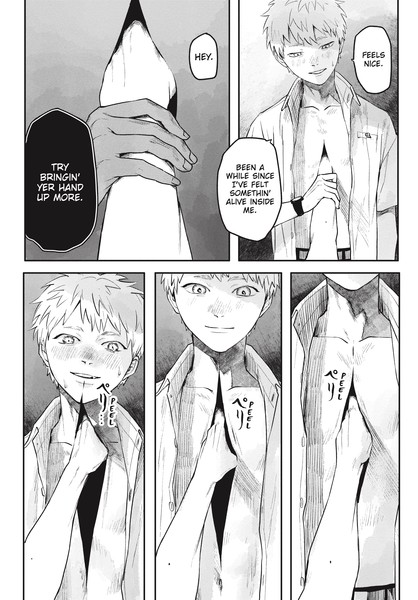
©Mokumokuren 2022/KADOKAWA CORPORATION
How did the idea of a doppelganger story first come about? Was there folklore that inspired you or a piece of media? Coincidentally, have you seen John Carpenter’s The Thing?
MOKUMOKUREN: I have never seen it, but it’s one of the films I’m interested in. Many things inspired me, but I’ve been thinking about the “Swampman” thought experiment since I first learned about it. Also, there are many stories of monsters taking the place of humans. But I wanted to read a story that strongly focused on the struggles of the monster, which was the starting point for the idea.
Do you see yourself reflected in any of the characters or their experiences?
MOKUMOKUREN: Most of the story is based on my imagination and research, but I added some of my own experiences to the psychological scenes to make it more realistic. Unfortunately, I’ve never seen a ghost, so the horror scenes are based on Japanese urban legends.
The Summer Hikaru Died‘s fifth volume is now available in Japan. What are the most important things you’ve learned while working on the series so far?
MOKUMOKUREN: Speaking on the manga production side, I learned that the balance between suspense and psychological depiction is important. I love both, but if there is too much of either, it becomes difficult to read. I try to keep a good balance between both and emphasize the tempo.
If you could give advice to teenagers who may have feelings similar to Yoshiki, what would you like to share?
MOKUMOKUREN: Yoshiki grew up in a secluded rural town and has many difficulties in life. His mother’s an outsider, his sister doesn’t go to school, his parents fight, and the way people around him look at him. He’s also concerned about his gender. He’s by no means a particularly unfortunate character but a protagonist with problems that can be found anywhere. And when Yoshiki faces the monster called “Hikaru,” he must also face himself.
There comes a time when almost every teenager, no matter where they live, must face themselves. They need to confront the parts they don’t want to acknowledge and the contradictions within themselves. I’m sure that’s the same for adults as well. I don’t want Yoshiki to be an ideal hero, but a protagonist who is close to those kinds of realistic concerns.
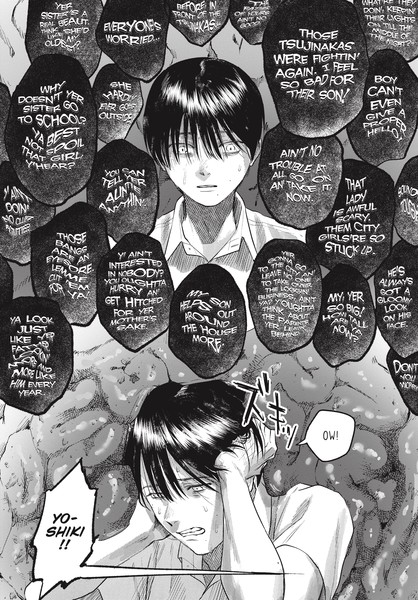
©Mokumokuren 2022/KADOKAWA CORPORATION
After so much positive reception to this series, what would you like to accomplish next?
MOKUMOKUREN: I’m thinking of writing a fantasy story for my next work, but I am still deciding. I like stories in various genres, so I want to take on many new challenges.
The series was also recently announced with an anime adaptation in the works. Do you have any comments you can share about the upcoming anime?
MOKUMOKUREN: As the original author, I’m participating in the production of the anime and exchanging ideas with the production team. I’ll do my best to create an improved anime without changing any of the important elements of the original work. I hope you will look forward to it.
Translation for this interview was provided by Ken Iikura-Gross.
Disclosure: Kadokawa World Entertainment (KWE), a wholly owned subsidiary of Kadokawa Corporation, is the majority owner of Anime News Network, LLC. Yen Press, BookWalker Global, and J-Novel Club are subsidiaries of KWE.
Source link
#Smalltown #Horror #Interview #Summer #Hikaru #Died #Creator #Mokumokuren

